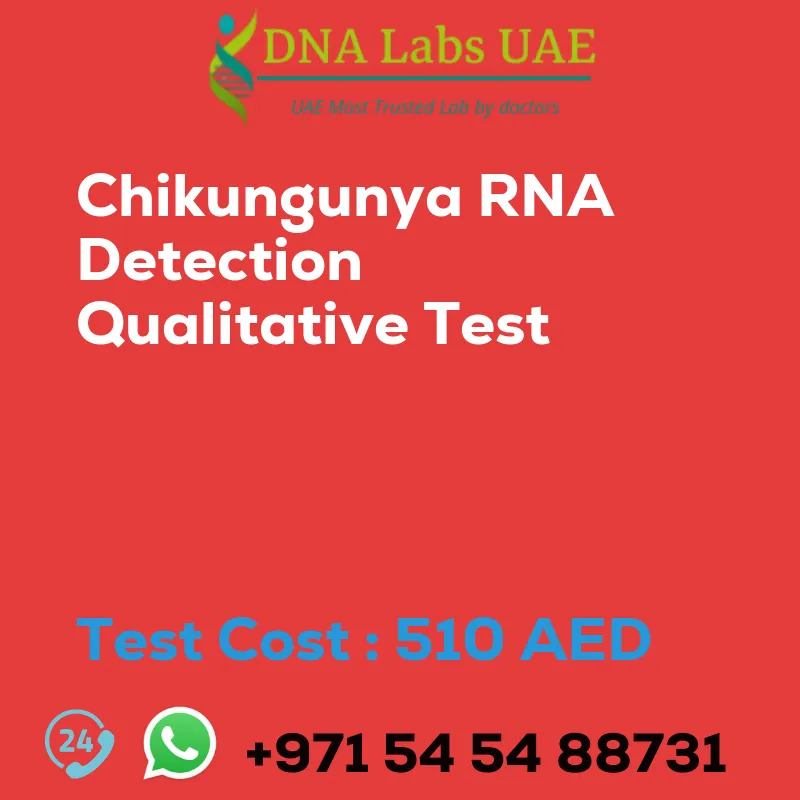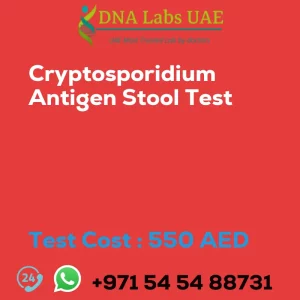Chikungunya RNA Detection Qualitative Test
Cost: 510.0 AED
Test Details
A Chikungunya RNA Detection Qualitative Test is a diagnostic tool used to detect the presence of Chikungunya virus RNA in a patient’s blood sample. Chikungunya is a viral disease transmitted to humans through the bite of infected Aedes mosquitoes.
Components
Price: 510.0 AED
Sample Condition
Serum, plasma, whole blood
Report Delivery
3rd Working Day Email: 36 hours
On phone: 24 hours
Method
Real Time PCR
Test Type
Viral
Doctor
Physician
Test Department
Genetics
Pre Test Information
Need to sign Consent document and bring any clinical history of patient for Chikungunya (RNA Detection) Qualitative Test
Test Procedure
The Chikungunya RNA Detection Qualitative Test works by using a technique called reverse transcription-polymerase chain reaction (RT-PCR) to amplify and detect specific regions of the Chikungunya virus RNA. The RNA is first converted into complementary DNA (cDNA) using reverse transcriptase enzyme. Then, the cDNA is amplified using PCR to produce multiple copies of the target viral RNA sequence. The test uses specific primers and probes that bind to the Chikungunya virus RNA sequence of interest. If the virus is present in the patient’s blood sample, the primers and probes will bind to the viral RNA, and the PCR amplification will produce a fluorescent signal. The presence of the fluorescent signal indicates a positive result, indicating the presence of Chikungunya virus in the patient’s blood.
Advantages of the Test
The Chikungunya RNA Detection Qualitative Test is highly sensitive and specific, allowing for early and accurate diagnosis of Chikungunya infection. It can be used in the early stages of infection, even before the onset of symptoms, enabling prompt treatment and appropriate public health measures to prevent the spread of the virus.
Limitations
It is important to note that this test only detects the presence of viral RNA and does not indicate the severity of the infection or the presence of antibodies. Additional tests may be required to assess the immune response and monitor the progression of the disease.
| Test Name | Chikungunya RNA Detection Qualitative Test |
|---|---|
| Components | |
| Price | 510.0 AED |
| Sample Condition | Serum, plasma, whole blood |
| Report Delivery | 3rd Working Day Email:-36 hours.On phone: 24 hours |
| Method | Real Time PCR |
| Test type | Viral |
| Doctor | Physician |
| Test Department: | Genetics |
| Pre Test Information | Need to sign Consent document and bring any clinical history of patient forChikungunya (RNA Detection) QualitativeTest |
| Test Details |
A Chikungunya RNA Detection Qualitative Test is a diagnostic tool used to detect the presence of Chikungunya virus RNA in a patient’s blood sample. Chikungunya is a viral disease transmitted to humans through the bite of infected Aedes mosquitoes. The test works by using a technique called reverse transcription-polymerase chain reaction (RT-PCR) to amplify and detect specific regions of the Chikungunya virus RNA. The RNA is first converted into complementary DNA (cDNA) using reverse transcriptase enzyme. Then, the cDNA is amplified using PCR to produce multiple copies of the target viral RNA sequence. The test uses specific primers and probes that bind to the Chikungunya virus RNA sequence of interest. If the virus is present in the patient’s blood sample, the primers and probes will bind to the viral RNA, and the PCR amplification will produce a fluorescent signal. The presence of the fluorescent signal indicates a positive result, indicating the presence of Chikungunya virus in the patient’s blood. The Chikungunya RNA Detection Qualitative Test is highly sensitive and specific, allowing for early and accurate diagnosis of Chikungunya infection. It can be used in the early stages of infection, even before the onset of symptoms, enabling prompt treatment and appropriate public health measures to prevent the spread of the virus. It is important to note that this test only detects the presence of viral RNA and does not indicate the severity of the infection or the presence of antibodies. Additional tests may be required to assess the immune response and monitor the progression of the disease. |








